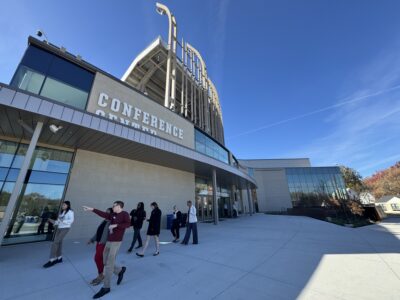Science standards evolve again

Kansas State Board of Education Chairman Bill Wagnon, left, and board member Kenneth Willard discuss science standards after the board adopted new, evolution-friendly science standards for Kansas public schools in a 6-4 vote. Wagnon voted Tuesday for the standards and Willard voted against them, as the board changed the science standards for the fifth time in eight years.

Kansas State Board of Education Chairman Bill Wagnon, left, and board member Kenneth Willard discuss science standards after the board adopted new, evolution-friendly science standards for Kansas public schools in a 6-4 vote. Wagnon voted Tuesday for the standards and Willard voted against them, as the board changed the science standards for the fifth time in eight years.
Topeka ? New, evolution-friendly science standards for Kansas’ public schools were adopted Tuesday by the State Board of Education, replacing ones that questioned the theory and generated international ridicule.
The new guidelines reflect mainstream scientific views of evolution and represent a political defeat for advocates of “intelligent design,” who had helped write the older standards being jettisoned.
Some scientists and science groups believed the board’s latest action was significant because it turned back a subtle attack on evolution that encouraged schools to teach about an evolution “controversy,” rather than mandating that creationism or intelligent design be taught. Intelligent design says an intelligent cause is the best way to explain some complex and orderly features of the universe.
“What we’re seeing around the country is more attempts to qualify or downgrade evolution,” said Eugenie Scott, executive director of the National Center for Science Education in Oakland, Calif., which fights efforts to undermine the teaching of evolution. “The ‘evidence against evolution’ is the creationism du jour.”
But John West, a senior fellow with the Seattle-based Discovery Institute, which supports intelligent design research, predicted the Kansas board’s vote would have little effect nationwide – just as states didn’t follow Kansas’ lead when the board adopted its previous standards in November 2005.
“It’s not going to be a precedent in other states,” he said. “Education is largely a state and local matter, so states are going to do what they think is best and so are local school boards.”
Nor do people involved in Kansas’ debate think the board’s 6-4 vote Tuesday settles the issue. State law will require the board to update the standards again by 2014, and elections before then could give conservatives a majority again.
“I think we’re good for two years,” said board member Janet Waugh, a Kansas City Democrat who supported the new standards. “Who knows what the election will hold in two years?”
Evolution debate
- 49abcnews.com video: State board dumps anti-evolution standards (02-13-07)
- Dodos flock to Darwin Day celebration (02-13-07)
- Educationboard to revisit debate over evolution (02-11-07)
- ‘Dodos’to flock to campus for Darwin Day (02-07-07)
- Newscience standards up for vote next month (01-10-07)
- Asold board departs, new evolution stance takes shape (12-14-06)
See-saw battle
The state has had five sets of standards in eight years, with anti- and pro-evolution versions, each doomed by the seesawing fortunes of socially conservative Republicans and a coalition of Democrats and moderate Republicans. The moderate bloc had a 6-4 majority after elections last year; conservatives prevailed when the board adopted anti-evolution guidelines 15 months ago.
Although other states have seen debates and court fights over evolution, Kansas’ back-and-forth have brought it additional attention. Scott also blames images others have of Kansas from “The Wizard of Oz.”
“It’s the centrality of Kansas as middle America and generic America that made this front-page news,” she said. “You aren’t unique, unfortunately.”
There were debates or legal battles in California, Georgia, Kentucky, Louisiana, Ohio, Nevada and South Carolina over evolution and “intelligent design.”
But none has inspired comedians’ jokes or parodies like Kansas’ ongoing battle has, such as the four-part “Evolution Schmevolution” series in 2005 on Comedy Central’s “The Daily Show.”
A conservative-led state board deleted most references to evolution in rewriting the standards in 1999; two years later, a less conservative board returned to evolution-friendly standards.
Conservative Republicans skeptical of evolution had a 6-4 majority when the standards came up for review again in 2005.

State Board of Education members Kathy Martin, left, and Sally Cauble look over new evolution-friendly science standards for Kansas public schools during a board meeting in Topeka. The board voted 6-4 on Tuesday to adopt new science standards that eliminate language about intelligent design. The intelligent design concept holds that life is so complex that it must have been created by a higher authority.
Hearings that year drew journalists from Canada, France, Great Britain and Japan. The National Academy of Sciences, the National Association of Science Teachers and the American Association for the Advancement of Science condemned the board’s actions.
But moderate Republicans captured two seats from conservatives in GOP primaries last year, guaranteeing a return to evolution-friendly guidelines.
Gov. Kathleen Sebelius, a Democrat re-elected last year, cited embarrassment caused by the board’s past decisions on evolution as a reason to strip it of its power to set education policy.
“Governor Sebelius has consistently said that we need more science education in our schools, not less, so she is relieved to see the State Board of Education take this action,” spokeswoman Nicole Corcoran said.
Mainstrem consensus
The board on Tuesday removed language suggesting that key evolutionary concepts – like a common origin for all life on Earth and change in species creating new ones – were controversial and being challenged by new research. Also approved was a new definition of science, specifically limiting it to the search for natural explanations of what’s observed in the universe.
“Those standards represent mainstream scientific consensus about both what science is and what evolution is,” said Jack Krebs, an Oskaloosa math and technology teacher who helped write the new guidelines. He is also president of Kansas Citizens for Science.
But the board’s conservative minority said the new standards will limit the relevant information students get about evolution.
“There seems to be a pattern,” said board member Steve Abrams, an Arkansas City Republican. “Anything that might question the veracity of evolution is deleted.”
Many Kansans harbor religious objections and other misgivings about evolution, even 198 years after British naturalist Charles Darwin’s birth, the anniversary of which was Monday. The Intelligent Design Network presented petitions with almost 4,000 signatures, opposing the standards the board eventually adopted.
How they voted
Voting yesSally Cauble, R-LiberalSue Gamble, R-ShawneeCarol Rupe, R-WichitaJana Shaver, R-IndependenceBill Wagnon, D-TopekaJanet Waugh, D-Kansas CityVoting noSteve Abrams, R-Arkansas CityJohn Bacon, R-OlatheKathy Martin, R-Clay CenterKen Willard, R-Hutchinson
“Let’s have an open mind and question things,” Rebecca Hoagland, a research statistician from Osawatomie, said during a public hearing before the board’s vote.
Hoagland said she home-schools her daughter and three sons. She believes public schools don’t teach students how to think critically about such subjects as evolution, and “I don’t see it changing.”
Family values
Greg Lassey, a retired Wichita-area biology teacher, said the new standards also undermine families by “discrediting parents who reject materialism and the ethics and morals it fosters.” And others, including John Calvert, a retired Lake Quivira attorney who help found the Intelligent Design Network, accused the board of promoting atheism.
But the Rev. Douglas Phenix, a retired Presbyterian minister from Topeka, welcomed the rewriting even though he acknowledged that, “The doctrine of creation is absolutely central to my belief system.” He said the standards being replaced were “fraudulent” and suggested students had to choose between faith and evolution.
“I feel personally offended,” he said. “It is a false choice.”
The state uses it standards to develop tests that measure how well students are learning science. Although decisions about what’s taught in classrooms remain with 296 local school boards, both sides in the evolution dispute say the standards will influence teachers as they try to ensure that their students test well.
Wichita Superintendent Winston Brooks said anti-evolution standards might have influenced teaching had they remained in place. But he and other educators had anticipated the old guidelines might be short-lived.
“We haven’t changed our science books. We haven’t changed our science curriculum,” Brooks said. “I guess it’s one of those things, if you wait long enough, this too shall pass.”
Evolution Timeline
Events important to the Kansas controversy over evolution:July 1, 1858: Linnean Society of London publishes joint paper from British naturalists Charles Darwin and Alfred Russel Wallace on natural selection and formation of new species.Nov. 24, 1859: First edition of Darwin’s “The Origin of Species,” outlining his theories about evolution, is published.Jan. 29, 1861: Kansas joins the Union as the 34th state.July 10, 1925: In Dayton, Tenn., John Scopes is tried for violating state law against teaching evolution. The “Monkey Trial” lasts eight days; Scopes is convicted and fined $100, but conviction is overturned on appeal. Nov. 12, 1968: U.S. Supreme Court strikes down an anti-evolution law in Arkansas, saying it violates a First Amendment mandate that government remain neutral on matters of religion.June 19, 1987: U.S. Supreme Court strikes down a Louisiana law forbidding teaching evolution unless creation science is also taught. The ruling bans teaching of creationism in public school.June 1991: Phillip Johnson, University of California law professor, publishes “Darwin on Trial,” criticizing evolutionary theory. Johnson becomes known as the founding father of intelligent design movement.May 11, 1999: Kansas Board of Education reviews proposed science standards written by a committee of educators. Board member Steve Abrams, an Arkansas City Republican, offers his own proposal, drafted with help from others, including the president of the Creation Science Association for Mid-America.Aug. 11, 1999: Board votes 6-4 to adopt science standards in which most references to evolution are eliminated.Feb. 9, 2000: Board member Scott Hill, an Abilene Republican who supported the new science standards, announces he won’t seek re-election. His seat is won by Bruce Wyatt, a Salina Republican critical of the board’s actions.Aug. 1, 2000: Republican primary voters oust state board members Linda Holloway, of Shawnee, and Mary Douglass Brown, of Wichita, who supported the new science standards. Their opponents opposed the standards.Jan. 9, 2001: Three new state board members, Wyatt; Sue Gamble, a Shawnee Republican, and Carol Rupe, a Wichita Republican, are sworn in, tipping power to a coalition of Democrats and moderate Republicans.Feb. 14, 2001: Board votes 7-3 for new science standards restoring evolution’s previous place in the standards as well-founded science, crucial for students to learn.Aug. 6, 2002: Conservatives Connie Morris, of St. Francis, and Iris Van Meter, of Thayer, win a GOP primary against incumbents who favored a return to evolution-friendly standards.Jan. 14, 2003: Morris and Van Meter are sworn in; board is split 5-5.Aug. 12, 2003: The state board votes 7-3 to have state science standards reviewed but says work won’t start for another year.Aug. 3, 2004: Conservative Kathy Martin, of Clay Center, unseats Wyatt in Republican primary.Jan. 11, 2005: Martin is sworn in, giving conservative Republicans a 6-4 majority on the board.May 5, 2005: Three-member subcommittee opens four days of hearings on evolution, hearing testimony from intelligent design advocates. National and state science groups boycott, saying the hearings are rigged.June 9, 2005: Subcommittee approves proposed standards containing language sought by intelligent design advocates.Nov. 8, 2005: Board approves proposed science standards that treat evolution as a flawed theory. March 14, 2006: Van Meter announces she won’t seek re-election.Aug. 1, 2006: Sally Cauble, of Liberal, defeats Morris in the GOP primary, while Jana Shaver, a moderate Republican from Independence, wins the GOP primary for Van Meter’s seat. Those victories guarantee a 6-4 moderate board majority in 2007-08.Nov. 7, 2006: Cauble and Shaver win their general election races. Three other board incumbents two conservative Republicans and a Democrat also win.Jan. 9, 2007: The board’s new moderate majority decides to reopen the debate over the science standards and reviews a proposal from a committee of scientists and educators.Tuesday: The board approves new standards.




